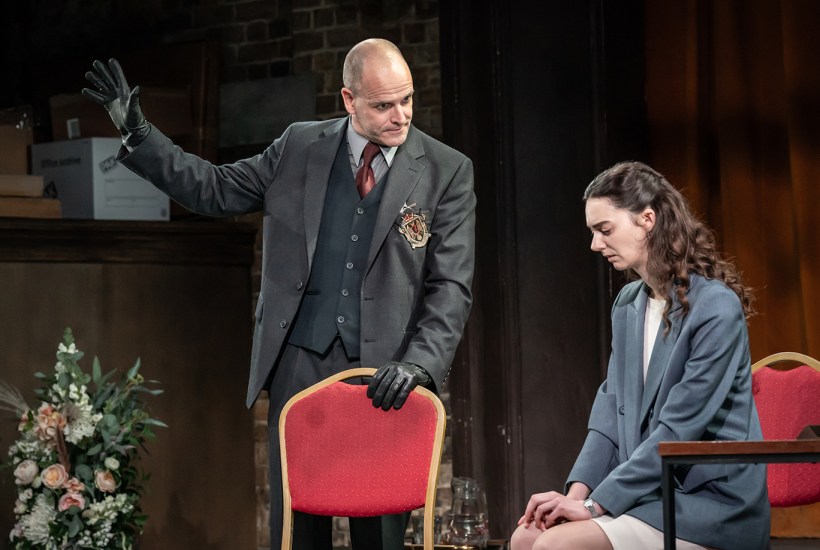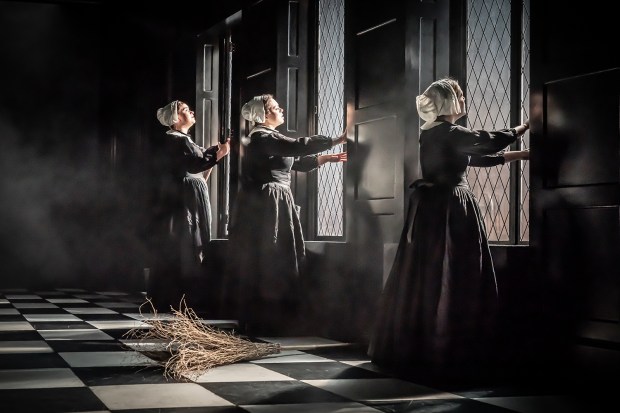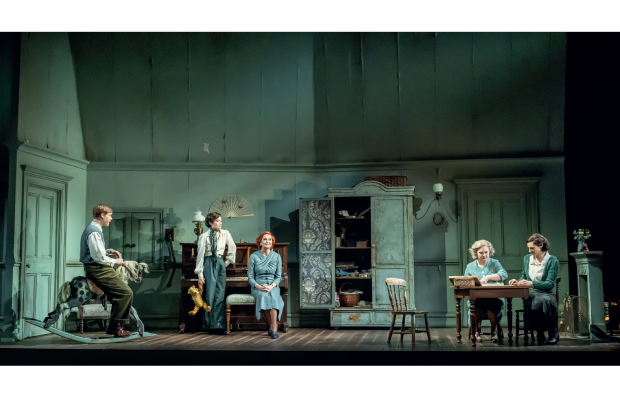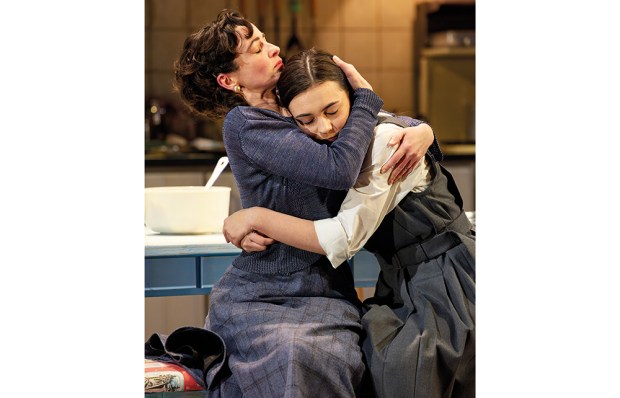The playwright Sam Holcroft likes to toy with dramatic conventions and to tease her audiences by withholding key information about the characters. This tinkering seems to scare the critics into praising her scripts even though they feel like clumsily written thrillers or botched sci-fi yarns where the rules keep changing. Her technique appeals to high-minded theatres such as the Almeida because it enables A-level drama students to fill their notebooks with impenetrable guff about ‘metatextuality’ and ‘poly-ironic approaches to narrative’.
Holcroft’s new satire, A Mirror, opens with a bogus wedding that gets disrupted when a gang of cops march on stage and cancel the ceremony. A strange start. Then the play proper begins and it turns into a play-within-a-play. Or rather several plays-within-a-play. We meet Celik (Jonny Lee Miller in a pair of sinister black gloves), who works as chief censor for a Stalinist regime that restricts public access to drama. Celik enjoys his role as a cultural commissar and he encourages a promising young dramatist, Narrowman, to mimic the style of an older writer, Bex, whose acclaimed scripts help to reinforce the regime’s hold over the populace.
An hour of stage time is taken up with Celik, Bex and Narrowman performing read-throughs of scripts in the offices of the ministry. But this leaves little time for the characters to step outside their roles as actors and to behave like human beings. And the nonsense about the bogus wedding keeps popping up again and again to give the show a feeling of dynamism and jeopardy. It all seems over-complicated and self-referential. If you remove the pretentious add-ons, the show is just a cheesy skit on the world of amateur dramatics. It could be Noises Off by an author who wants to be Brecht or Pirandello. And the comedy fails because the stereotypes it mocks are tired and predictable.
Celik is a caricature of the tyrannical, sexually repressed impresario. Bex stands for the drunken, puffed-up author who adores his own reputation. Narrowman, a feebly drawn character, comes across as a callow rebel but he has no other discernible qualities. A fourth personality, Mei, plays Celik’s bashful, skittish and diffident secretary. She also appears in the rehearsal sections as a similar character – bashful, skittish and diffident. None of these figures seem interesting or likeable. In the final moments, four new personalities burst on to the stage and deliver a comic surprise that explains the show’s subtitle, ‘this play is a lie’. An amusing gag but not worth waiting 125 minutes for.
A new musical, The Little Big Things, indulges in some metatextual flourishes of its own. The show takes place inside the unconscious mind of a 17-year-old rugby star, Henry Fraser, who lies in hospital with a broken neck. The poor chap has just paralysed himself by diving head-first into a Portuguese rockpool. Under anaesthetic, he meets his future self who uses a wheelchair, and the young lads discuss how to get through life without the help of their limbs. Dramatically, it’s a very bad idea to share an emotional challenge between two different characters but this doesn’t matter because the show isn’t a drama but a religious service. The congregation follows Henry’s journey from anguish to understanding and finally to redemption. His goal is to surrender to his injures so completely that he starts to revere the accident that crippled him and to regard his fate as a blessing. Only then can he embrace real freedom.
It takes a very long time for this subtle psychological change to take place and the rest of the play is devoted to nice songs, pretty costumes and jolly dance routines. The characterisation is rudimentary. Henry’s parents and brothers are shown as well-meaning lightweights who have no real faults or rough edges. And the excellence of the NHS is taken as gospel even though the script suggests that Henry’s treatment is seriously flawed. His bossy doctors order him to spend 17 months convalescing in hospital but thankfully he breaks free after just nine months. No wonder he’s desperate to escape. The medics won’t let him sun his face in the grounds of the hospital for more than five minutes each day. Why not? What a monstrous cruelty to impose on a man who loves gardens and animals. After fleeing the NHS gulag, he becomes a painter whose work is widely praised.
But even Henry is a bland and soapy character. The best figure in the show is Agnes, a cocky, foul-mouthed physiotherapist who herself uses a wheelchair. She mocks Henry’s love of rugby, and she amuses herself by bullying his mother whom she calls ‘an old boot’. Though she’s arrogant, mean-spirited and fabulously rude, Agnes feels like a real human being. Played by the dazzling Amy Trigg, she’s the best thing in this bland piece of community theatre.
Got something to add? Join the discussion and comment below.
Get 10 issues for just $10
Subscribe to The Spectator Australia today for the next 10 magazine issues, plus full online access, for just $10.
You might disagree with half of it, but you’ll enjoy reading all of it. Try your first month for free, then just $2 a week for the remainder of your first year.














Comments
Don't miss out
Join the conversation with other Spectator Australia readers. Subscribe to leave a comment.
SUBSCRIBEAlready a subscriber? Log in